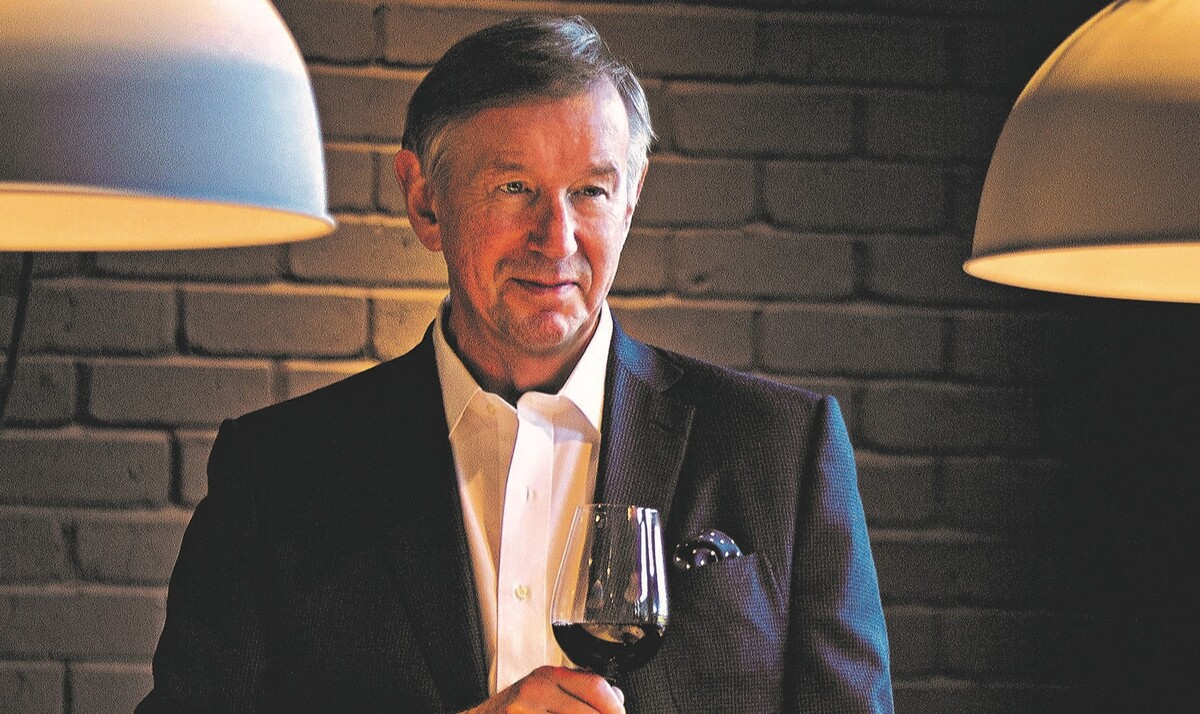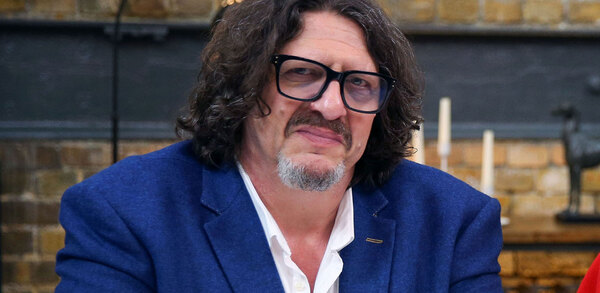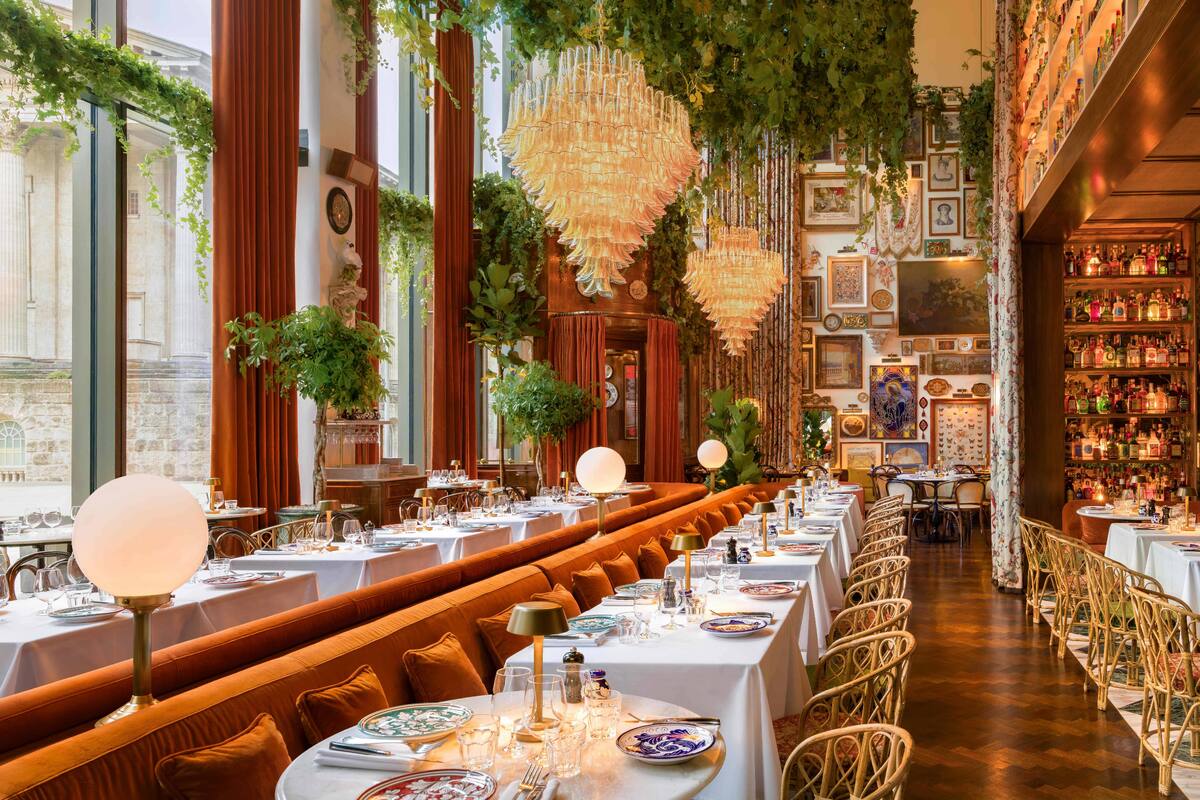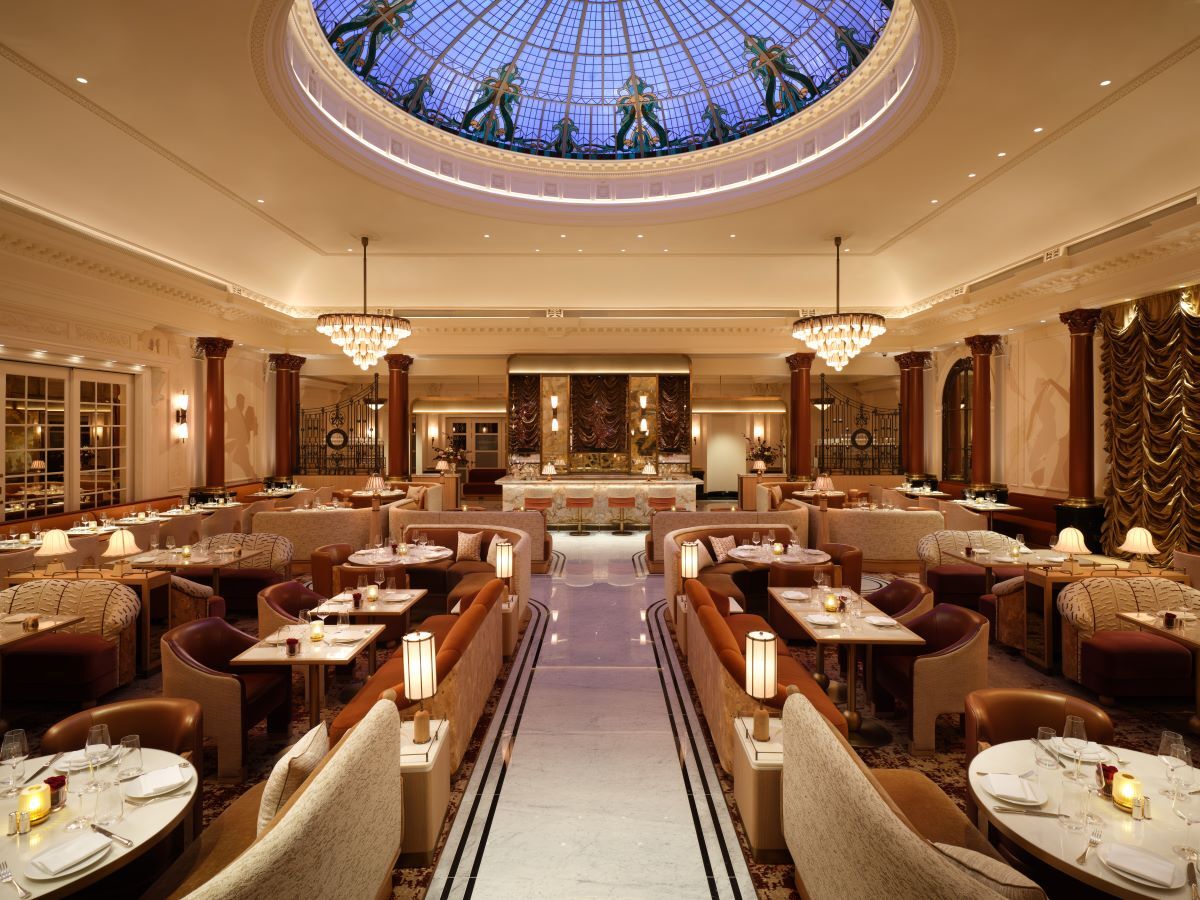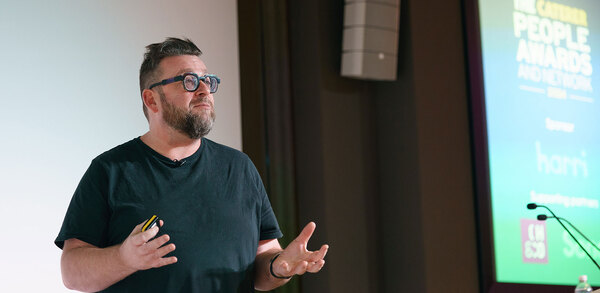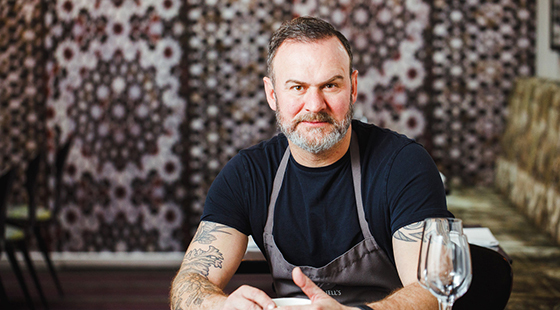Interview: Giorgio Locatelli on opening in Dubai and reining in restaurant UK plans
He has a new restaurant in Dubai, but has reined in domestic expansion plans, pulling out of the deal for York & Albany plus the pursuit of any more properties in the UK for the time being. Joanna Wood talks to Giorgio Locatelli about joining the band of mega-chefs in the Middle East, the challenges of working with a major hotel group, and how you shouldn't have to pay for a smile
Giorgio Locatelli is Italian, which means he has a lot to say on pretty much any subject you care to throw at him. And he doesn't do it quietly, spicing his volubility with his native Italian and choice bits of Anglo-Saxon. He's Latin, he's passionate, so this isn't surprising - very occasionally, however, he clams up.
This happens when you bring up subjects such as the financial details of his newest restaurant, Ronda Locatelli, in Dubai (located in the 1,570-bedroom Atlantis The Palm hotel). "No, no, I have to say no, I don't want to discuss figures," he insists, before acceding: "We don't rent space, they are the owner and we take a percentage…"
We're sitting in his compact, daylight-starved office at Locanda Locatelli, his acclaimed London restaurant off Portman Square. There's room, just, to swing a cat. Shelves are stuffed with books and files and there's a window overlooking the main kitchen pass, the view partially obscured by a series of celebrity autographs scrawled on the glass: Bono, Ronnie Wood, Damien Hirst, Valentino Rossi. "Look, can you read that one?" says Locatelli excitedly, "It's Flea - Red Hot Chilli Peppers!"
Settling himself down with a coffee, Locatelli returns to the subject of Dubai. He didn't have a particular ambition to venture abroad. In fact, at one time it looked as though he would acquire the site of the York & Albany hotel overlooking London's Regent's Park which eventually found its way in to the Gordon Ramsay stable and opened last autumn under Angela Hartnett's leadership. "We loved the place, but there was too much to do there to get it right," he says. "I didn't have the financial leniency behind me to take it on. It was too much of a step."
ALTERNATIVE EXPANSION
With York & Albany no longer on the cards, Locatelli looked around for an alternative expansion project. He was eager to extend his restaurant empire (we're talking about 2006-7, before the current economic decline had set in), convinced it was the right moment to build his branding and establish the promotional scope that a second "Locatelli" restaurant would give to key members of his staff.
A promotional trip to Dubai arranged by InterContinental (which at the time owned the Churchill hotel, where Locanda Locatelli is sited) afforded him the opportunity to look around the United Arab Emirates' city-state and he began to ponder the idea of a presence in the Middle East.
This led to discussions with his wife Plaxy and some of his team at Locanda and eventually to intermediaries making contact with the Kerzner group, which was keen to attract top international chefs to its Atlantis The Palm resort in Dubai. A deal was signed for Locatelli to set up a 240-seat restaurant, Ronda, in the dedicated foodie area at the resort. Ranged around it are venues from international big-hitters Michel Rostang, Santi Santamaria and Nobu Matsuhisa, so Locatelli is in good company.
Given that Locanda Locatelli's success is founded in large part on the fact that it's run on personal lines by Locatelli, who is often to be seen greeting and chatting to his diners, getting into bed with a big corporation such as Kerzner on a project like Atlantis The Palm (a glorified, if undeniably exciting and upmarket, themed mega-resort) seems a little incongruous. Locatelli is aware of the juxtaposition. "I absolutely understand the point. Our main problem was getting Kerzner to see that you have to put skills into people by training. We talked and talked about it and we even got Sol Kerzner to come along and see how we worked at Locanda for him to understand."
MANAGEMENT SKILLS
Getting Ronda operating consistently to the standard he demands will be an ongoing process, one suspects - and dependent on the management skills of key members of staff installed in Dubai by Locatelli. This includes people such as head chef Alessandro Bottazzi and restaurant manager Ugo Braggio, both Locatelli protégés.
Despite the restaurant's best efforts, some local Dubai blogsites have been less than satisfied with service at Ronda since it opened, but restaurant reviewers have judged otherwise, with Dubai's Time Out pundit declaring front-of-house to be "soothing" and "so relaxedly, unforcedly cheerful and, well, un-Dubai, that the restaurant might as well have been in Wonderland."
In fact, Ronda has the type of rustic dishes that Locatelli used to serve when he was executive chef at London's Spiga restaurant, while working for A-Z Restaurants in the early 2000s: fritti, risotto, chargrilled lamb, pizza - all dishes that suit a sun-and-sea, Mediterranean-style location. It's centred on a circular eating bar (hence the Ronda name) surrounding the restaurant's pièce de résistance - a huge pizza oven. "We can cook nine pizzas every three minutes," he boasts.
They've needed to. Ronda Locatelli opened to a reservations waiting list, thanks to soft opening reports (from September 2008) on the dining-out grapevine in Dubai. "We were doing 400 covers a day before the hotel was fully opened," reveals Locatelli. Nevertheless, he's wary of being complacent: "I think there is less possibility of Dubai being really hit by the current economic crisis - but I don't know."
At Locanda Locatelli in London, despite a healthy bookings ratio of around three enquiries for every table booked at the turn of the new year, Locatelli is bracing himself for tougher trading times as 2009 progresses. "I think everybody's heading for a heavy time. Let's hope not, but you have to prepare your business, be careful on how you spend, watch the petty cash, for instance," he says.
It's clear that despite his expansive Italian personality Locatelli is a cautious man, certainly as far as business is concerned. Throughout our conversation, he keeps stressing the desirability of growing a restaurant empire organically. "We took seven years to grow Locanda properly, seeking perfection. In business, little steps at a time are important. Being greedy is a bad thing. People who have over-stretched themselves in the past few years will be paying the price now."
This business conservatism extends to a reluctance in having all his operating systems bound up in modern technology. He insists that waiting staff know how to take orders in the old-fashioned pen-and-chit way, as well as on computerised palm systems: that kitchen ordering has a paper trail as well as an on-screen one. This way, he contends, everybody has quick access to information in an emergency.
"It's so important," he asserts. "For example, in Dubai everything is electronic. But we had one day when the whole system packed up. Some people didn't manage to operate, but because we had people who still took the order the old way we did business. You can make shoes in the big factory, but you still need the guys who put them together by hand!"
Maybe the attitude is a generational thing. Locatelli is 45 now and although IT-literate, computers are not in his blood. But it's probably nearer the truth to say that, like all successful fine-dining chef-restaurateurs, Locatelli is at heart an artisan whose passion is for crafted food made and served with soul rather than by machines. "Flavours are such an important part of our memory," he insists. "The opportunity of searching for the best produce is a very important quest for a chef. Food has a different reach from other things - there are many consumer things that you put around your body, but few that you put down your mouth."
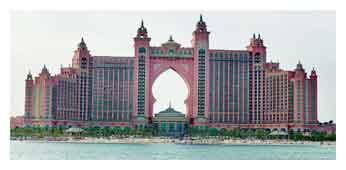
SERVICE CHARGES
Locatelli is similarly heated about service charges on menus. "How much is a smile worth? You don't know - to you it might be £400, to me, nothing. For this reason we don't include service charges at Locanda." And he has vehement opinions about non-Italians cooking Italian cuisine. "I object to the industrialisation of Italian food - but I admire anybody who cooks out of experience.
"Take Jamie Oliver - through him, Italian food has gained. I'm sure some people who come to us come because of him. And Angela Hartnett deserves every success - to use a recipe that you have eaten as a little girl growing up with your grandmother and to bring to it your own knowledge as a trained chef as she does, I have admiration for it. That's exactly what I have done. Just because I have an Italian passport doesn't mean I am a better chef."
Warming to the more general theme of cooking beyond a cultural heritage, he adds: "Some people talk about the bastardisation of French food in England, but there is better produce in dishes now in London restaurants than they have in France. I am sure of that."
An unwise gesticulation at this point results in a glass of water being upended, and Locatelli is instantly concerned to mop up the damage, enabling me to put one final question to him. It's a personal one, so I'm not guaranteed an answer, but it has to be done. What, I ponder, has happened to his trademark flowing locks? Without them, he looks less flamboyant and somewhat wearier - even menacing.
"I know," he grins, "I look like a Mossad agent, don't I? But Plaxy and Margarita [his daughter] said ‘we're really going to CUT your hair'. They promised me I'm going to look like George Clooney when it grows a bit."
RONDA LOCATELLI Seats: 240
Staff: 29 kitchen, 40-43 front-of-house
Menu examples
- Pumpkin ravioli with butter and sage sauce, pine nuts
- Grilled white asparagus salad
- Veal sweetbreads with celery and watercress
- Chargrilled lamb cutlet with roasted beetroot, Swiss chard
- Goat's cheese and garlic pizza
- Fritti
- Filet of poached Italian beef with salsa verde
- Desserts include tiramisù, panna cotta, zucotto, and confit of blackberry yogurt ice-cream
Opening: Sat-Thurs 12 noon-2.30pm, 6pm-11.30pm. Friday 12 noon-11.50pm
www.atlantisthepalm.com
**
ATLANTIS THE PALM JUMEIRAH
**Owned by Kerzner International, this themed magastructure is straight out of Hollywood - or perhaps South Africa's Sun City. It comprises:
- Two hotels with a bedroom capacity of 1,570
- 17 restaurants
- Waterpark (2km-long wave river, 1m-high waves and submerged tunnel through shark-filled aquarium or lagoon)
- Dolphin education centre
- 5,600sq m of conference centre
- Aquarium
- Spa
- Fitness centres
- 1.4km sandy beaches
- Gardens and pools
- Luxury shopping mall
WHAT FUTURE FOR DUBAI?
Once held up as the place to defy the credit crunch where all around it financial markets were crumbling, Dubai is now feeling it like everyone else. That will be bad news for big-name chefs, who have all established outposts of their mini-empires in the chase for Middle-Eastern cash.
Where previously there was talk of seven-star hotels, air-conditioned beaches, and skiing in the desert, now airport car parks are full of expensive rental cars, left by fleeing expats who can't afford the hire charges. Half of the £400b building projects are on hold, while banks have stopped lending, hotels are three-quarters empty and the stock market has plunged 70%.
The general diagnosis is that in the short term the region will suffer, but that long-term there's enough being built to bring the tourists back. After all, new building projects that are still in play amount to the equivalent of the recent US stimulus package.
For the sake of a number of our best-known chefs, you hope things will improve. Since 2001 when Gordon Ramsay's restaurant group (Gordon Ramsay Holdings) first took up the food and beverage consultancy at the Hilton Dubai Creek, there has been a stampede of stars to the United Arab Emirates city. Gary Rhodes, Vineet Bhatia, Pierre Gagnaire, Giorgio Locatelli, Santi Santamaria, Michel Rostang, Nobu Matsuhisa have all opened up, too. Newcomers set to launch in Dubai include renowned pastry chef Oriol Balaguer (2009), branches of the Ivy and Le Caprice and Alan Yau's Yauatcha (2010).
So there's still plenty going on, but Abu Dhabi, near neighbour of Dubai and capital of the UAE, may be better placed to take advantage of tourist money. Unlike Dubai, the oil cash has been hoarded - not spent. The state also has 95% of the reserves, and half of the entire Emirates GDP, too. It's a slower burn there, but a Hakkasan outpost is opening in 2010 and in February of this year a first gourmet food festival (www.gourmetabudhabi.ae) was launched. We saw many culinary names in negotiation with possible backers, including Atul Kochhar, Charlie Trotter, Alain Passard and Annie Féolde. Watch out for developments.


